

Virtual tours of cities & places. If It Were My Home. Because Every Country Is the Best at Something. Thanks to all the readers who have sent in suggestions.
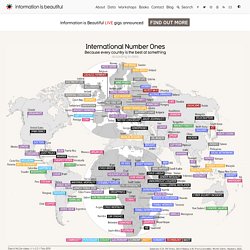
Check out the data for the full list of sources and updates. CORRECTIONS & UPDATES » Slovakia changed to ‘cars’ – Feb 2018 » Czech Republic changed to ‘libraries’ – Feb 2018 » Canada changed from ‘personal freedom’ to ‘doughnuts’ – Mar 2017 » Turkey ‘jailed journalists’ added alongside ‘Twitter censorship’ – Mar 2017 » China changed from ‘jailed journalists’ to ‘hackers’ – Mar 2017 » South Africa changed from Death to number 1 for Platinum – Dec 2016 » Canada upgraded to ‘personal freedom’ from ‘Facebook addiction’ – Dec 2016. Make Cities Explode in Size With These Interactive Maps. Around 5 B.C., Rome became the first city in recorded history to reach 1 million residents.

It took nearly two millennia for another city hit the same milestone: London, in the 1800s. Then came the Industrial Revolution of the 19th century, which sparked an urban explosion as people flocked to cities seeking manufacturing jobs born out of a new, mechanized society. At the same time, world population was growing at an unprecedented rate—between the 1800s and today, the number of people living on Earth has risen six-fold.
By 1950, New York’s population was greater than 10 million, making it the world’s first megacity. Now, less than a century later, the world boasts 31 megacities. The history of how a city has grown can be challenging to chart. Today the world’s megacities account for 15 percent of global GDP, and that figure is projected to rise to 20 percent by the end of the decade. For all the ills of city living, however, highly concentrated populations can have certain advantages. Tourists Could Destroy Venice—If Floods Don't First. Floods were once the greatest threat to Venice.
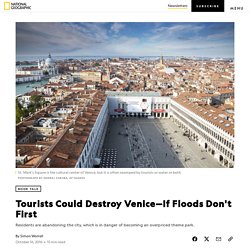
That danger has not receded, but the tsunami of tourists pouring into the city could cause greater harm, argues Salvatore Settis in his new book, If Venice Dies. Venetians are being driven out of the city by skyrocketing rent while giant cruise ships dwarf the skyline, risking a disaster like the Costa Concordia, the boat that sank off the Tuscan coast. There’s even talk of building a Venice theme park just outside the city. (Find out what it’s like to live in Venice.) Speaking from his home in Pisa, Settis, an internationally renowned art historian, explains why saving Venice is not just important for Venetians but for all humanity, how the city inspired a new vision for Manhattan in the 1920s, and how corruption has blighted a major flood-control scheme. Most of us who have seen Venice have gone there as tourists. The fact that many tourists are willing to go to Venice is in itself a good thing.
Paris. Fenêtres sur l'Histoire. Suite à ma série de photos sur les 70 ans de la Libération de Paris (ici), les éditions Parigramme m’ont proposé le même type d’exercice sur l’Histoire de Paris.
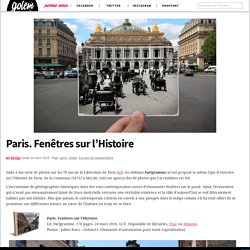
De la Commune (1871) à Mai 68, voici un aperçu des 80 photos que j’ai réalisées cet été. L’incrustation de photographies historiques dans des vues contemporaines ouvre d’étonnantes fenêtres sur le passé. Eric Sanderson: New York. 25 surprising travel facts that’ll make you see the world in a whole new light. Travel: we sort of know all about it, right?
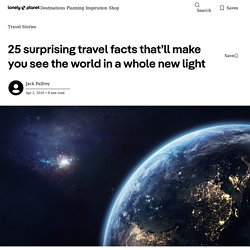
Wrong. Scratch beneath the surface and it turns out we know nothing of this world. Do you know how long the world’s shortest commercial flight lasts, for example? (clue: shorter than the time it takes to boil an egg.) How about which country has no rivers? With international travel currently off the table, why not use this time to swat up on surprising travel trivia, offering a few precious minutes of sweet relief from the constant news cycle and providing some fun facts to fill awkward pauses during video calls with friends and family; trust us, nothing plugs a silence better than a stat about how many steps from the nearest trash bin you are in Disneyland at all times. Without further ado, here’s 25 travel facts that are certain to shock and surprise. Trains, planes and automobiles... 1. 2. 3. 4. 5.
That’s the entire population of Australia. Things you didn’t know about countries… 6. Lizard Point Geography Quizzes clickable map quizzes for fun and learning. Eslbrains - Would you walk your dog around the world? This lesson plan is based on a short video presenting a man sharing experiences from his unusual journey and focuses on vocabulary in particular travel phrasal verbs.

Students will also have a lot of opportunities to speak as they will share their travelling experiences as well as discuss how Anthony Bourdain perceived travelling. Travel Phrasal verbs The worksheet starts with tasks built around travel phrasal verbs. First, students get six sentences and they have to finish them by choosing correct answer which will reflect the meaning of a given phrasal verb. Next, students complete questions with the correct forms of some of the phrasal verbs from the previous exercise. Quote & vocabulary Then, students move to the next part of the lesson plan. Video & discussion. Soar – Film English. This ELT lesson plan is designed around a delightful short film by Alyce Tzue titled Soar, and the theme of flying.
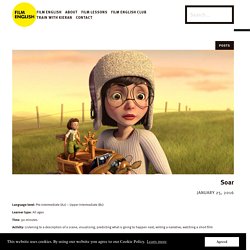
Students listen to a description of a scene, visualise it, predict what is going to happen next, write a narrative, watch a short film and discuss it. Step 1 Write to fly on the board and ask your students to come up with as many things or animals that can fly.